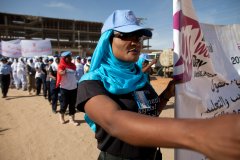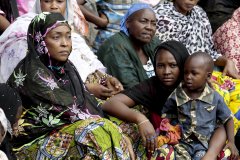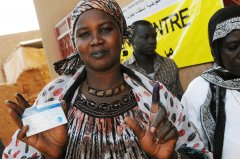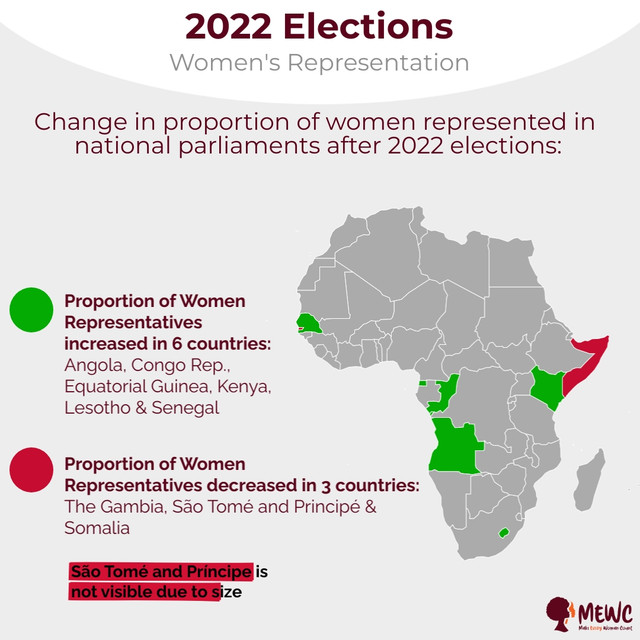Gender Issues Showlist
Women, Peace & Security
UNSCR 1325 calls on all parties to: protect and respect the rights of women and girls in conflict & post-conflict; increase women participation in all conflict resolution, peacekeeping and peace-building & to end impunity by prosecuting perpetrators of sexual and other violence on women and girls
index.php?option=com_content&view=category&id=56&Itemid=1913
Human Rights of Women
Thirty six years after the adoption of CEDAW, many women and girls still do not have equal opportunities to realize rights recognized by law. Women are denied the right to own property or inherit land. They face social exclusion, “honor killings”, FGM, trafficking, restricted mobility, early marriage,...
index.php?option=com_content&view=category&id=44&Itemid=1908
Violence Against Women
Violence against women is the most shameful human rights violation. Gender based violence not only violates human rights, but also hampers productivity, reduces human capital and undermines economic growth. It is estimated that up to 70 per cent of women experience violence in their lifetime
index.php?option=com_content&view=category&id=69&Itemid=1912
Political Participation & Leadership
Where women are fully represented, societies are more peaceful and stable. Women political participation is fundamental for gender equality and their representation in positions of leadership must be a priority for all Africans governments.
index.php?option=com_content&view=category&id=65&Itemid=1911
Latest News
- Chad: Parliamentary Elections 2024
- Namibia: General Elections 2024
- Mozambique: Parliamentary and Presidential Elections 2024
- Tunisia: Presidential Elections 2024
- MEWC is looking for Research & Communications Interns
- COTE D'IVOIRE: South-South Meeting to Promote Gender Equality and Combat Deforestation
- RWANDA: Rwanda Set to Launch Cervical Cancer Elimination Plan
- NIGERIA: Over 5,000 Nigerian Women Stranded in Iraq - Govt
- SUDAN: Healthcare Collapse Threatens Pregnant Women in Sudan's Sharg El Nil
- GHANA: President Nominates 12 More Ministers
TANZANIA: Education Should Be First Priority - Former Leader
Source: All Africa
FORMER Prime Minister Edward Lowassa at one time told a public rally at a village in Mwanza Region, that the Fourth Phase Government under President Jakaya Kikwete had three priorities.
Listing the priorities, Mr Lowassa said the first one was education. He went on to say that the second, education and the third one was education as well.
Mr Lowassa's remarks some five years ago reflects the importance that the government in Tanzania has consistently given priority to education since the country's independence in 1961.
At independence the Father of the Nation, Mwalimu Julius Nyerere declared ignorance, along with poverty and disease, as the nation's major enemies. Presenting their views to the Constitutional Review Commission (CRC) at Milola and Nyengedi Villages in Lindi Rural District, the residents expressed deep concern over poor conditions in primary and secondary schools in the country.
"We have many challenges in the education sector ranging from lack of teachers, textbooks to desks, classrooms and even latrines," said Mr ali Bakari Maliwata, a resident of Milola B Ujamaa Village. He said pupils and students in primary and secondary schools were not learning properly due to lack of teachers. "Education is the right of every citizen in this country. This right should not be ignored or infringed," Mr Maliwata stressed.
Mr Ali Abdallah Kidole of Kilwa Masoko, on the other hand, said Swahili should be the medium of instruction at all levels of education.
"Our children want education but they fail to cope in secondary schools and universities because everything there is in English," he said. Education is treated as a strategic agent for transformation of the mindset and for the creation of a well educated nation, that is sufficiently equipped with the knowledge needed to competently and competitively solve development challenges facing the nation.
The International Covenant on Economic, Social and Cultural Rights (ICESCR) is among the core international human rights documents that guarantee the right to education. Education is recognised by various human rights instruments as a basic right for all people. Article 11 of the Constitution of the United Republic provides for the rigfht to education.
It is provided under 11(2) that every person has the right to access education, and every citizen shall be free to pursue education in a field of his choice up to the highest level according to their merits and ability.
The government on its part shall make efforts to ensure that all persons are afforded equal and sufficient opportunity to pursue education and vocational training at all levels of schools and other institutions of learning.
Tanzanian education policies lack clear and well defined targets and are not thoroughly co-ordinated to produce desired outcomes. The policies seem to concentrate on quantity and not focused on quality, thus making it difficult to transform the community.
The government, however, deserves to be commended for its efforts in increasing the number of students at all levels of education - from pre-school to university. Tanzania has managed to build both new primary and secondary schools, although the quality of these facilities could still be improved.
However, the number of enrolment at all levels has posed many challenges including concerns about the quality of education, inequality in terms of gender and social status, lack of human resources and allocation of funds.
The quality of teaching in regions that are in the periphery, including those in the southern coastal regions of Lindi and Mtwara, are exremely poor due to substandard facilities. Access to secondary education in formal centres is restricted due to many fcators, including poverty, lack of community sensitisation, school girl pregnancies and inadequate facilities and teachers.
These problems are not restricted to rural areas. In Dar es Salaam, for example, Saranga Primary School in Kinondoni municipality has only 10 classrooms and 17 teachers, who cater for more than 1,080 pupils.
Some classrooms hold more than 200 pupils which is well above the government's recommended limit of 45. The teacher to pupil ratio is 1:60 due to shortage of teachers. This means some pupils have to squat on the floor for up to eight hours per day in a crowded classroom, mostly for lack of desks.
Tanzania has also experienced rampant increase of dropouts and poor performance due to many factors including lack of sufficient facilities, especially desks, classrooms, latrines, domitories and residential houses for teachers.
An official report on Mtwara shows that the region has 802 secondary school teachers out of the required 2,820, which represents a shortage of 71.4 per cent. A region with such a shortage of teachers will find it difficult to provide quality education for students.
Thousands of girls drop out of school along the way from primary school to higher learning institutions due to pregnancy. Despite the fact that net enrolment in secondary school is above the MKUKUTA level of 25 per cent, the gender parity index is very poor in many government secondary schools.
According to the LHRC's 2010 survey, a major hindrance to the ability of girls to access education is pregnancy. This problem is particularly serious in southern regions of Lindi, Mtwara and Ruvuma. This situation, according to the LHRC is also experienced in other countries including Kenya, Malawi, Australia and Uganda.
The Ministry of Education and Vocation Training in 2003, created a regulation of aiming at punishing people who make school girls pregnant or those who assist in making underage girls get married, but the situation has not helped much in reducing drop outs.
Much as the practice of expelling pregnant girls from schools in common in many parts of the world, some countries like Malawi, Australia and South Africa have developed policies of accepting parenting girls in schools.





